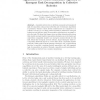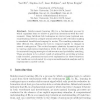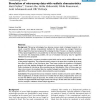94 search results - page 2 / 19 » Analysis of a Computational Biology Simulation Technique on ... |
PPSN
2004
Springer
13 years 9 months ago
2004
Springer
A scalable architecture to facilitate emergent (self-organized) task decomposition using neural networks and evolutionary algorithms is presented. Various control system architectu...
MICAI
2005
Springer
13 years 9 months ago
2005
Springer
In Multi-agent based simulation (MABS) systems, computational models are built as multi-agent systems (MAS). Replication of these models can contribute to improve the reliability o...
ECAL
2001
Springer
13 years 8 months ago
2001
Springer
Reinforcement learning (RL) is a fundamental process by which organisms learn to achieve a goal from interactions with the environment. Using Artificial Life techniques we derive ...
BMCBI
2006
13 years 4 months ago
2006
Background: Microarray technologies have become common tools in biological research. As a result, a need for effective computational methods for data analysis has emerged. Numerou...
GECCO
2007
Springer
13 years 10 months ago
2007
Springer
Computation in biology and in conventional computer architectures seem to share some features, yet many of their important characteristics are very different. To address this, [1]...



